Kateryna Pavlova battled a pandemic, wildfires, corruption, and sexism in the Chernobyl Exclusion Zone
By Susan D’Agostino | April 29, 2021
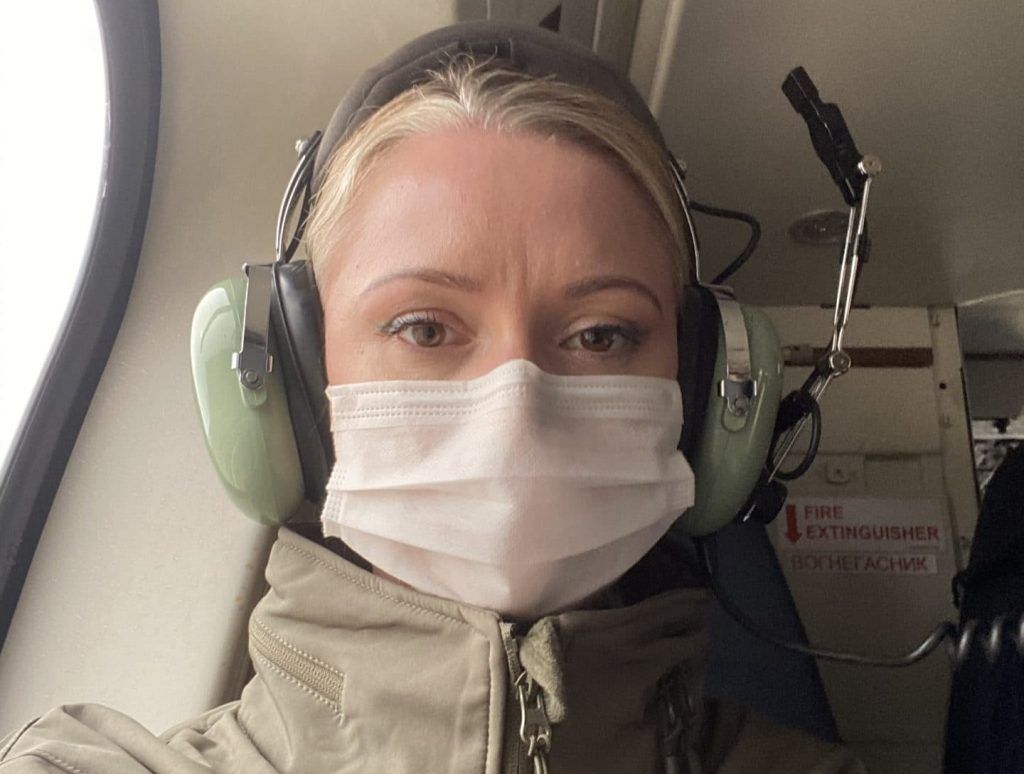 Kateryna Pavlova served as acting head of the Chernobyl Exclusion Zone during the 2020 wildfires and COVID-19 pandemic. Photo permission from Kateryna Pavlova.
Kateryna Pavlova served as acting head of the Chernobyl Exclusion Zone during the 2020 wildfires and COVID-19 pandemic. Photo permission from Kateryna Pavlova.
Kateryna Pavlova was two years old in 1986, living approximately 500 kilometers away from the Chernobyl (Chornobyl in Ukrainian) Nuclear Power Plant, when workers ran a routine test that started a reactor fire and led to the world’s worst nuclear disaster. Later, in grade school and high school, she learned some facts about the accident, though information was sparse. In 2003, on a train home from Kharkiv National Technical University where she was studying power engineering, she met an old man who had been a high-level power engineer during the time of the Chernobyl disaster. He shared information and nuance she could not have then obtained through Ukrainian public records. That encounter led her to seek out and read the International Atomic Energy Association’s INSAG-1 report—the first report published after the accident—which offered an international perspective on the disaster. Soon after, Pavlova headed to Denmark for graduate study in power engineering. Upon earning her master’s degree, the State Agency of Ukraine on Exclusion Zone Management selected her to lead its Department for International Cooperation and Public Relations.
“That was when I really got in touch with the Chernobyl story,” said Pavlova who, in her public relations role, engaged with Ukrainian citizens and government officials, along with members of the international nuclear community.
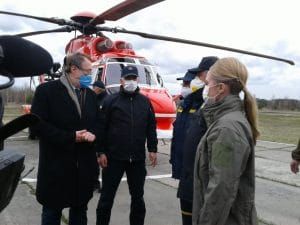
In February 2020, Pavlova was selected as the first woman to lead the Chernobyl Exclusion Zone. One month later, in March, COVID-19 was declared a pandemic. When wildfires overtook the territory in April, she was also appointed as chief of staff for exclusion zone wildfire management.
I caught up with Pavlova recently to talk about her experiences managing thousands of workers on the site of the world’s worst nuclear accident during a pandemic while battling wildfires. What follows is an edited and condensed transcript of our conversation.
Susan D’Agostino: What was your experience aspiring to serve as the first woman acting head of the State Agency for the Chernobyl Exclusion Zone Management?
Kateryna Pavlova: My ex-boss was fired because the government changed. When he was fired, they opened a special competition in Ukraine for high-level civil service. So many people said to me, “Oh Kateryna, it’s impossible. You are a woman. You cannot be head of an agency. It is a big responsibility.” And I said, “My ex-boss didn’t have even special education for this position.”
I had a special education and good experience, including five years in the exclusion zone working on sensitive projects. Ukraine is not so good for gender equality. It was a really big fight. When I won first place in this competition, many people were angry. But of all participants in this competition, I was the only one with the special power engineering education. Among the others were some lawyers and some teachers of geography or economical subjects.
I won first place in the competition but was not hired for this job. The prime minister canceled this competition and opened one more competition.
Susan D’Agostino: Did he offer an explanation? Or did you create your own understanding of why?
Kateryna Pavlova: I think, first of all, because I was not from any oligarch support. Unfortunately, in Ukraine, oligarchs keep key positions and decide who will be where. I only had my education and experience.
Also, in my interview, the minister of ecology said to me, “…but you’re so young.”
I asked him, “Which year were you born?” He said, “1984.” And I said, “Nice to meet you. I was also born in 1984. Why do you think you can be responsible for energy and ecology all over Ukraine, and I cannot be responsible for exclusion zone management?”
The story is funny because they opened a second competition and expected I wouldn’t apply. I will be true with you. I had some bad messages from people who wanted to go to this area for the budget money. But I thought about my good connection with the public and on Ukrainian TV [in the role as head of the State Agency of Ukraine on Exclusion Zone Management’s Department for International Cooperation and Public Relations]. If something happened to me, information would go all over, not just Ukraine. So, I entered the second competition.
Susan D’Agostino: Good for you.
Kateryna Pavlova: At the end of January 2020, I got information that said, “Please come to sign documents to be acting head.”
Why acting head? They said I was not hired as permanent head because I had a high-level position inside of the agency. If I had stayed in my position as acting head for three months, then I would have become head. But they replaced me one week before I had three months.
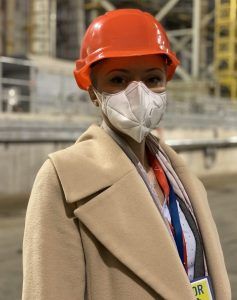
Susan D’Agostino: Nonetheless, those three months—February through April 2020—were eventful. They coincided with the start of the COVID-19 pandemic and massive wildfires in the exclusion zone.
Kateryna Pavlova: Yes, I started as acting head on February 5, 2020. We have eight state enterprises with 6,000 workers. At first, I ran all over Kiev to prepare budget documents for the minister of finance. I needed salaries and money to keep all of the exclusion zone enterprises running. On March 13th, I got the budget.
The next big issue was the pandemic. In that time, no one knew what to do in a pandemic. We had no procedures or laws. Nothing. My team and I worked almost one week without breaks. We created a special line of responsibility and plans of action for each enterprise director.
Then, transportation all over Ukraine was shut down. Can you imagine? I had thousands of people working in the exclusion zone who needed food and to be evacuated. It was a hard time, but our plan worked. I am very proud that, in the first wave of coronavirus, we had zero cases of coronavirus [among 6,000 exclusion zone workers]. No one was sick because we controlled everything. We left just 800 people working in shifts in the exclusion zone. With all of the infrastructure inside the exclusion zone, we kept running the enterprises.
Susan D’Agostino: What do the workers in the exclusion zone do?
Kateryna Pavlova: They work on decommissioning activities that are consequences of the accident. We also have a facility and enterprise for radioactive waste management. And we have facilities that care about radiation spent, spent nuclear fuel, and so on.
Ukraine is third place in the world for the amount of radioactive waste. We have thousands of people inside the exclusion zone to work with all these facilities. We also have a radiological biosphere reserve with people who care about the forest.
Susan D’Agostino: Okay, so you got the budget and the pandemic exclusion zone operations under control. When did the wildfires strike?
Kateryna Pavlova: On April 3rd, I opened the internet and saw there was a big fire very near the exclusion zone territory. It was evening. I called to our exclusion zone forest workers and asked them to search in this area to see how fast this fire was going and if it was coming our way. They said, “No, Kateryna, it will not come. It’s far.”
I said, “No. You should go now and make me a report, even in the night. I should know where this fire is going.”
Around nine o’clock in the evening, I got information: “It’s coming our way! Please help! It’s big!” We have low- and high-level fires. When it’s fire in the grass, it’s not so dangerous. But when the fire is in the trees, it’s very dangerous. And this fire was going directly to the exclusion zone. We didn’t have enough power to keep it under control, so I called to the head of the agency to ask that he [declare an emergency].
He said, “Kateryna, please go sleep. It’s just a woman’s nervousness. I have a report from my workers that all is okay.”
I said, “No, it’s not under control. It’s really big and coming our way.” I [insisted] that he send cars and workers. We needed help from emergency services.
In the night, I went directly to the exclusion zone to meet our coordination team. In the morning, we sent planes all over the exclusion zone to see where the fire was. I sent reports to our police and national security guard. I also kept in touch with the head of the biosphere reserve in Belarus who told me, “Kateryna, it’s very strange. We have the same straw, the same weather, and the same wind, but we don’t have this kind of fire. Why is your fire so much?”
I thought about why. When I came to the agency, I started to fight against corruption. I fired a lot of people who were engaged in corrupt schemes.
Susan D’Agostino: Wait, let me first ask, how did you find out about the corruption?
Kateryna Pavlova: I had a good team of workers with me. We searched documents from all of our enterprises. We could see when there was something wrong with budget money. One of the directors of an enterprise had such a high salary. I asked, “Has he found a vaccine for coronavirus? Why is his salary so high?”
Susan D’Agostino: Okay, so back to the wildfires. Did you suspect foul play there?
Kateryna Pavlova: My suggestion was that some was from nature, but some was made by a human. The police found one person living nearby the exclusion zone who was setting straw on fire, and this straw was going to exclusion zone. It’s a stupid mentality—sorry for this word—of people from the village.
I started to inform the public. We went to nearby territories to inform them: “Please be careful! Don’t fire the straw!” And we started special meetings with the forest workers to explain to them how to act.
Susan D’Agostino: There’s a lot going on in your story. Was your engagement mostly as a negotiator on the phone or were you on the ground, close to the flames?
Kateryna Pavlova: I was all the time almost next to the fire.
We needed people who had been sent home because of the pandemic to come back. We had 1,000 workers fighting against the fire who needed food, water, and sleep every day. I sent cars from our enterprise facilities to bring people back. I also needed to prepare so many documents for the cabinet of ministers so that they would give extra money for this fire. I cannot take this money from, for example, radioactive waste management. I didn’t have money to fight against fire. The stupid bureaucracy in Ukraine. I think I sent 40 letters. And so many explanations and paragraphs at three o’clock in the night.
Susan D’Agostino: Did you get the money you needed?
Kateryna Pavlova: I went to the meeting of the cabinet of ministers. They were talking just about coronavirus. I said, “Hey guys, please put your attention here. We don’t have even diesel to put in cars to go to fight the fire. We have no food for workers.”
I was so angry. I didn’t stay quiet and wait my turn. I said, “Hey, either you give money to me today, or I don’t know what will happen. I must go back to the fire exclusion zone, but please give me money. Here are all of the documents. What are you waiting for?”
That way, I got government support—something like 33 or 35 million hryvnia [approximately $1.2 or $1.26 million]—to fight against this fire.
Susan D’Agostino: Okay, so back at the wildfires in the exclusion zone, what were you thinking as a new disaster unfolded on this site already known for the world’s worst nuclear disaster?
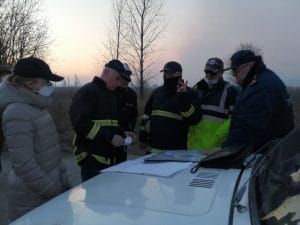
Kateryna Pavlova: In the exclusion zone, an enterprise called Ecocenter monitors and controls the radiation. We have very educated staff that offers a high level of technical support. Wherever there were fires, they took samples. All fire workers had special monitoring sticks with them to count how big of a dose they got. We had high levels of radiation especially in the place of the fires. It was dangerous nearby the fire but not more than can be acceptable for the human body.
My goal was to fight against the fire and not to lose any workers. The exclusion zone is not standard territory. It is this big forest—more than 20,000 square kilometers. We don’t have infrastructure for cars. It’s very dangerous as workers could go inside and the fire could surround them.
I’m very happy that we didn’t lose any workers. Of course, it was a bad situation. We lost a lot of flora, fauna, and maybe some animals. But can you imagine if something had happened with some workers? It would have been on my hand.
Susan D’Agostino: I’ve heard you discuss “monetary radiation” in reference to the exclusion zone corruption. Why do you use this nuclear term?
Kateryna Pavlova: Radiation and corruption are very similar because you cannot see them, but their impact is big.
Chernobyl is far from Kiev. It’s a closed territory where you cannot check exactly what’s going on. There’s a very big risk of corruption there because of its big budget. Also, we have built and organized special processes in this sphere which are not understandable to people in other government spheres. Someone can come and say, “Hey, this special door for this enterprise doesn’t cost 500,000. It costs one million.” It’s a special area where cheating is simple.
Unfortunately, in this sphere, it’s common to have people without knowledge or understanding of the seriousness. Even now, in our agency, we have some who don’t even know how radiation is counted or who don’t understand its impact. They don’t know the difference between RBMK [high-channel power-type] reactor and a boiling water reactor. How can they make good result? They seem to be just about money.
Susan D’Agostino: Do you have a sense of who are the people trying to take advantage of the Chernobyl exclusion zone budget?
Kateryna Pavlova: It’s powerful teams who want their businesses in budget projects. For example, we have a budget to build storage for radioactive waste. Someone wants his company to build this storage, not another company. So, he says, “Please decide that I will build the storage, and you will have something.” It’s not always money; it may be something else. In 21st century, it should not be that way. Our president says that we should be a Europe, with no corruption. But if you want to be a Europe, we should be Europe here [points to head].
Susan D’Agostino: You’re suggesting that a more European mindset would help. The aftermath of the 1986 Chernobyl disaster ushered in a new safety mindset at nuclear power plants worldwide. It’s one thing to create and enforce specific rules in a particular setting that say, for example, “don’t smoke here” or “wear these protective glasses.” But how do you change the culture of an entire country?
Kateryna Pavlova: I lived for almost seven years in Denmark. There, I saw people who loved their language and their country. They respected the tax office and understood how to work and live in their country. They were so proud of their country. Why can’t we have the same in Ukraine?
I had only three months as acting head of the Chernobyl Exclusion Zone, but I fought. Even if they fired me, I wanted to do something. Maybe it’s not much, but I tried to make the Chernobyl Exclusion Zone look more European than like the dark side of humanity. My heart and soul are clear.
Ukraine is like a body of some person who is very sick. We’re a weak country now. When a new team comes in with the Ukrainian president, they should work with this very, very sick body. They should be a doctor who will do anything possible to save this body and allow it to grow into a person who will be not sick after a while. A person who is a cook in the kitchen cannot be a doctor for this body. A person who is a driver cannot be a doctor. We need a special expert to treat this sick body.
Together, we make the world safer.
The Bulletin elevates expert voices above the noise. But as an independent nonprofit organization, our operations depend on the support of readers like you. Help us continue to deliver quality journalism that holds leaders accountable. Your support of our work at any level is important. In return, we promise our coverage will be understandable, influential, vigilant, solution-oriented, and fair-minded. Together we can make a difference.
Keywords: women
Topics: Interviews, Nuclear Energy, Nuclear Risk
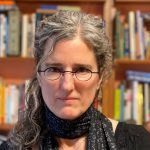















Excelent interview!! Great and inspiring to see woman with the character, the mental and moral qualities, both personal and professional, of Kateryna dealing with that huge environmental problem in Chernobyl Exclusion Zone.